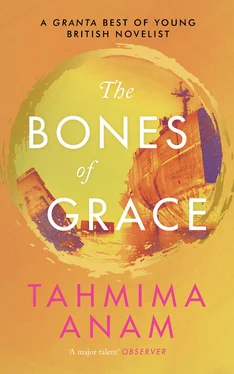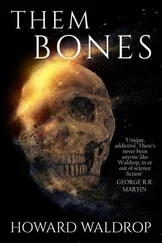‘There are a few, but the one I’m looking for is called Ambulocetus . It was discovered about twenty years ago, but no one has been able to bring back a complete skeleton. That’s why I’m going to Pakistan.’ We talked awhile about Ambulocetus . Even though I had explained this story many times, to many people, I felt as if I was revealing a secret about myself. This was a feeling that would return to me many times in your presence, of giving away more than I intended to. It was neither unpleasant nor comfortable.
The food arrived. The sandwiches looked small and pale sitting alone on their heavy porcelain plates. The tea was in a giant mug, the orange juice in corrugated-plastic cups. I picked up the sandwich, which was almost as high as it was wide, and took a bite. The egg came loose between the layers and spilled onto my chin, the plate. I was embarrassed, and tried to keep my lips closed, alarmed by the intensity of flavour and volume in my mouth.
At this point, I believe you may have thought you’d committed a faux pas. You said, ‘There’s sausage in that sandwich — you don’t eat pork?’
I allowed myself to hesitate a little before laughing. ‘It’s all right,’ I said, ‘just don’t tell my parents.’
You pulled the plate from me. ‘I’m so sorry.’
‘I’m joking. Really, I am. My parents don’t care, they’re not religious. Give me my sandwich.’ I pulled the plate back. You asked if I was Muslim, and I said yes, I was, but that I came from a family of sceptics. Nationalism was the religion in our household. ‘They’re communists. Sort of. The Bangladesh war changed them.’
I think I may have mentioned at that moment, by way of explanation, that my mother drove an ambulance during the war. I wanted to bring up the subject of my adoption again. To repeat that my parents were not my only parents, that I had other parents, parents I had hardly thought about until last night. The image of your home — the cabin, the maple trees — was deepening in my mind. I could smell pine and hear the clamour of your family. Your story made my story into a sad one, and I began to regard you with some envy. Also, I could not understand why you were suddenly in limbo, after having had what appeared to be such a privileged life. You mentioned again that you’d been to India, that you might like to go again.
‘I had a friend from there, I went to visit her family. And then we travelled together to Nepal, and Bhutan.’
I sprang back into the moment. I wanted to ask you the name of this girl. I crossed and uncrossed my arms, trying to find the most casual, relaxed pose I could to express how much this story was not bothering me. I told myself that people fell in love with you all the time. You were cartoonishly handsome. Even your forehead was sexy, big and flat and serious. I tilted my orange juice till there was nothing left at the bottom of the cup, and then, not being able to resist, I said, ‘Was she your girlfriend?’
‘She was, for a long time. But it was over by the time I went to India.’
‘Did you break her heart?’ The longing to be that girl, drawing you towards me from across the continents, was so strong I felt a surge of blood to my legs.
‘No.’ I would learn, over time, that you were the master of the meaning-burdened one-word answer.
I looked into the pools of your eyes, the light ring of your eyelashes, allowing you to see inside me. ‘Last night, you looked so beautiful when you cried. I’ve never seen anyone cry like that,’ you said.
‘Can I ask you now why you are dressed so formally?’
‘Today is my grandmother’s funeral.’
You told me you had sauntered into an internet café in Pondicherry, ready to write a long email to your family about that town, the fort and the little shacks on the edge of the beach where you had admired the sunset, each evening a different shade of pink, and you were thinking how different the sun was there, bigger yet somehow further away than in Vermont, where it stood alone without the frame of clouds. And then you discovered your father had been trying to reach you for days, calling all your friends and asking if they knew where you were. But you had travelled to Pondicherry alone — Reeva, the girl, had left you in Mysore and gone back to Delhi. As you told me this story, that lost expression came over you again, the one I had seen last night as the lights came on in the auditorium, and now I wanted to tell you I was looking for something too, something that couldn’t be found in the ankle bones of a whale. You pulled your chair forward and pressed your chest against the rim of the table.
‘How terrible for you,’ I said. ‘I’m so sorry.’ And we stayed that way for a long time. And then I told you. I hadn’t meant to, not right then, but it just came out. ‘There’s something I should have said yesterday. About me.’
‘What’s that?’ I had slipped off my sandals and I was sitting cross-legged on the chair, but now I straightened up and planted my feet back on the ground.
‘I have a person — a boyfriend — back home.’
‘Really?’
‘His name is Rashid.’
‘Rashid,’ you repeated.
‘We’ve known each other our whole lives. We’ll probably get married or something,’ I said, letting it all come out in a rush. ‘Of course, not that you care, or anything, I just — I just thought, since we just met—’
‘I wish I’d met you before.’
‘I didn’t want to give you the wrong impression.’
Our sandwiches had been devoured, the mugs emptied. The waitress returned, tore a page from her pad, and left it on the table. I couldn’t tell if you were disappointed. Were you? Or perhaps, with the death of your grandmother, you were unable to register much of anything at that moment, your every feeling crowded by some other feeling. Even now, when I think back, I wonder if our story would have ended differently if I had told you at some other moment, or in some other way.
‘So,’ you said, inhaling deeply, ‘what were you planning to do your last few days in Cambridge?’
‘Nothing much. Finish at the lab, return some library books.’
The meal was over. I put my palms on the table. ‘Thank you for breakfast.’
‘I wish it was two weeks ago,’ you said again. ‘Or last year.’
‘Me too,’ I replied, believing I meant it more.
We looked at each other, wondering what to do next. Finally you said, ‘Would you like to come to my grandmother’s funeral?’
I tried to imagine what would happen if my grandmother died and I brought you to her funeral. ‘No, I don’t think so.’
‘How about later? We’re having lunch at my mother’s.’
I didn’t want to meet your entire family, not like this, but I wanted an excuse to see you again. I said, ‘I thought about last night, and it all made sense to me. It’s because I’m going, and I’m not sure when I’ll be back — something like that.’
‘You’re an intermediate species, like Ambulocetus .’
‘Exactly.’
‘Maybe if we’d met under different circumstances, we might have decided to see what it was like. To be together. But if that’s not on the cards, that’s okay. I still want to spend time with you. Is that all right?’
‘Of course,’ I said. ‘I do too.’ I was unsure if I had gotten what I wanted. Without being coy or hesitant, you spoke about our being together, and accepted with equanimity that we would not be. I should have been relieved — an awkwardness averted — but instead I felt disappointed, as if the conversation had hurried past me and I had failed to hail it down.
You asked if I had ever heard the Goldberg Variations. I hadn’t. ‘You remind me of number thirteen,’ you said. ‘Shostakovich is okay, but Bach is the source.’
Читать дальше












